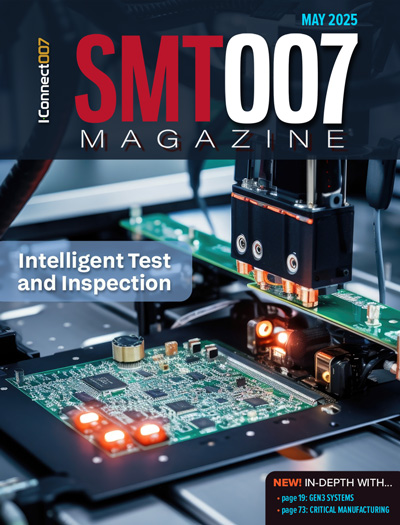-

- News
- Books
Featured Books
- smt007 Magazine
Latest Issues
Current Issue
What's Your Sweet Spot?
Are you in a niche that’s growing or shrinking? Is it time to reassess and refocus? We spotlight companies thriving by redefining or reinforcing their niche. What are their insights?

Moving Forward With Confidence
In this issue, we focus on sales and quoting, workforce training, new IPC leadership in the U.S. and Canada, the effects of tariffs, CFX standards, and much more—all designed to provide perspective as you move through the cloud bank of today's shifting economic market.

Intelligent Test and Inspection
Are you ready to explore the cutting-edge advancements shaping the electronics manufacturing industry? The May 2025 issue of SMT007 Magazine is packed with insights, innovations, and expert perspectives that you won’t want to miss.
- Articles
- Columns
- Links
- Media kit
||| MENU - smt007 Magazine
U.S. Congress Approves Funds for R&D on Lead-Free Electronics in Aerospace, Defense and High-Performance Applications
December 22, 2020 | IPCEstimated reading time: 1 minute
The U.S. Congress on Monday approved $10 million for research into the issues surrounding lead-free electronics in mission-critical applications.
IPC, the global association of electronics manufacturers, and its allies had called for these funds to be included in the Fiscal 2021 defense appropriations bill. That bill cleared the U.S. House and Senate last night as part of an omnibus legislative package. President Trump is expected to sign it.
Over the last 15 years, the commercial electronics industry has largely phased out its use of lead (Pb) in electronic components and circuit assemblies, driven by government regulations and concerns about lead’s harmful effects on human health and the environment. However, the aerospace, defense and high-performance (ADHP) sectors have been reluctant to migrate to lead-free electronics because there is inadequate data on the reliability of lead-free components in ADHP applications.
The gap between commercial and defense electronics is growing wider as lead-free becomes more established in commercial technologies, and as governments – particularly in Europe – have implemented more stringent rules on the use of lead. Today’s defense electronics are now 15 to 20 years behind the commercial market in terms of the underlying materials used, undermining supply chain resiliency and technological superiority.
“This vote is a win for U.S. taxpayers, defense readiness, and the electronics industry supply chain,” said Chris Mitchell, IPC vice president of global government relations.
“The migration of the commercial industry to lead-free electronics has created supply-chain concerns for the ADHP sectors that can only be overcome through public-private R&D,” he added. “These funds will support a collaborative research effort that will help ensure that mission-critical systems have full access to cutting-edge electronics from a robust global supply chain.”
“Together with our partners in the Pb-Free Electronics Risk Management (PERM) Council, IPC will continue to advocate for a proactive, long-term approach to this issue,” Mitchell added.
IPC President and CEO John Mitchell recently delved into these issues in an article in Defense News titled, “Protecting America’s military prowess requires an embrace of lead-free electronics.”
Industry experts believe a five-year, $40 million investment in a public-private R&D program would yield more than $100 million in U.S. defense savings per year and improve military readiness and overall innovation. The Congress provided $5 million for such R&D in FY 2020.
Suggested Items
Wolfspeed Stock Soars After Filing for Chapter 11 Bankruptcy
07/01/2025 | I-Connect007 Editorial TeamOn July 1, Wolfspeed shares doubled following the company’s announcement on June 30 that it had filed for Chapter 11 bankruptcy protection.
Zollner Completes Full Acquisition of Bluechips Microhouse
07/01/2025 | Zollner Elektronik AGZollner Elektronik AG has successfully finalized its com- plete takeover of Bluechips Microhouse Co., Ltd., in Thailand. In the future the company will operate as part of the Zollner Group of companies under the leadership of Thomas Kiefl – strategically networked, technologically focused and internationally oriented.
Inission Acquires the Lithuanian Company Selteka
07/01/2025 | InissionInission AB has signed an agreement to acquire 100% of UAB Selteka. Selteka is a well-respected EMS (electronics manufacturing services) company with operations located in Kaunas, Lithuania.
RTX, Shield AI Partner to Develop New Defense Capabilities
07/01/2025 | RTXRTX and Shield AI announced a new partnership to integrate Shield AI capabilities into select RTX defense products, like loitering munitions and sensors. This collaboration will deliver enhanced, autonomous capabilities to US and allied defense forces.
Lockheed Martin Completes Acquisition of Amentum’s Rapid Solutions Portfolio
07/01/2025 | Lockheed MartinLockheed Martin has closed its acquisition of the Rapid Solutions business of Amentum, an engineering and technology solutions company.


